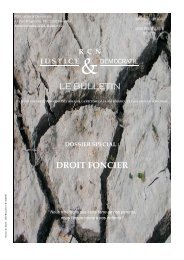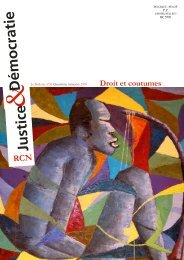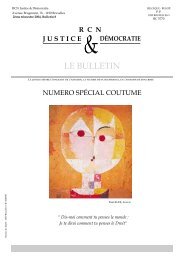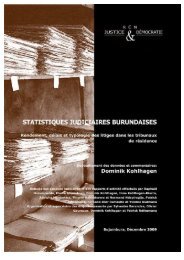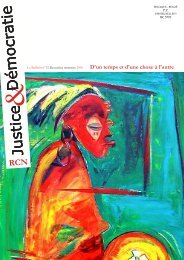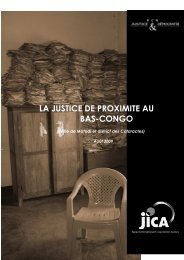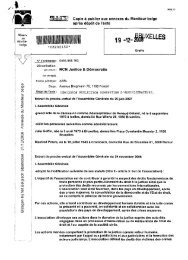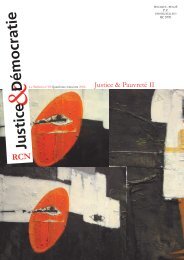Démocratie
extrait du bulletin n°25 - RCN Justice & Démocratie
extrait du bulletin n°25 - RCN Justice & Démocratie
You also want an ePaper? Increase the reach of your titles
YUMPU automatically turns print PDFs into web optimized ePapers that Google loves.
Southern Sudan<br />
The geopolitical situation<br />
Southern Sudan has an estimated population of 11<br />
million and its territory covers 589.745 km2. Southern<br />
Sudan consists of ten states: Lakes, Warrap,<br />
Northern Bahr el Ghazal, Western Bahr el Ghazal,<br />
Unity, Jonglei, Upper Nile, Eastern Equatoria, Western<br />
Equatoria and Bahr el Jebel. The national government<br />
and the states in Southern Sudan are<br />
linked through the Government of Southern Sudan<br />
(GoSS). The president is Salva Kiir Mayardit. The GDP<br />
per capita in Sudan is 2,083 PPP US $. The human<br />
development index value is 0.526, which gives Sudan<br />
a rank of 147th out of the 177 countries classified<br />
(UNDP, HDR 2007/2008).<br />
The signing and implementation of the Comprehensive<br />
Peace Agreement (CPA) between the Government<br />
of Sudan and the Sudan Peoples Liberation<br />
Movement (SPLM) in January 2005 led to the formation<br />
of the power-sharing Government of National<br />
Unity (GoNU) which established the semi autonomous<br />
Government of Southern Sudan (GOSS). This<br />
power sharing governance can be best described as<br />
‘one country, two systems’.<br />
With the signing of the CPA, Southern Sudan entered<br />
into a new phase peace process and reconstruction<br />
of the country after nearly two decades of<br />
civil war. The GoSS has developed an interim Constitution,<br />
and is geared to political elections in 2009,<br />
which should pave the way for a referendum on self<br />
determination in 2011. Although GOSS has the will<br />
and determination to establish stable social, economic<br />
and political structures, it presently faces a<br />
state-building exercise of enormous proportions.<br />
The implementation<br />
of the CPA is constantly<br />
challenged by<br />
disputes and disagreements<br />
on issues<br />
such as demarcation<br />
of borders in certain<br />
areas, failure to<br />
meet deadlines on redeployment of armed forces,<br />
disagreement on the Abyei boundary commission<br />
report and wealth and revenue sharing. In addition<br />
to this, use and occupation of land and resources,<br />
the steady stream of returnees into Southern Sudan,<br />
weak institutional structures have continued to pose<br />
a threat to the smooth implementation of the CPA.<br />
The signing of CPA in January 2005 signalled the<br />
urgency of carrying out a population census in the<br />
entire country, as this a tool for sustainability of<br />
peace and the basis of power and wealth sharing<br />
and elections, as well as the 2011 referendum” - CPA.<br />
After some initial disagreements between the NCP<br />
and the SPLM on the modalities, form and timing of<br />
the census, it was finally conducted and concluded in<br />
late April 2008.<br />
M.C.




